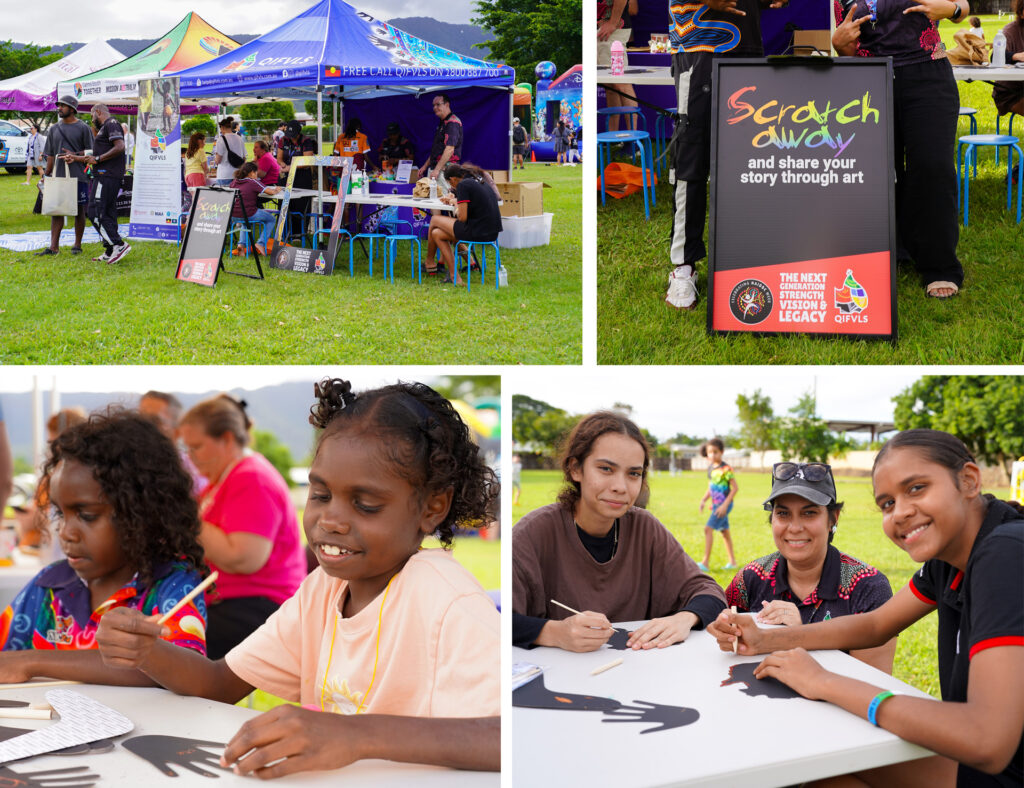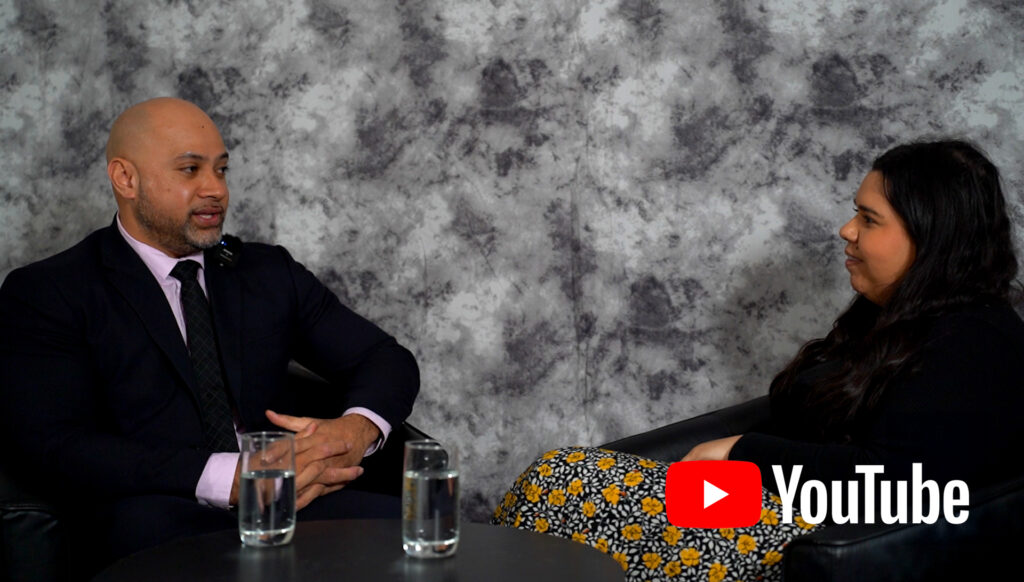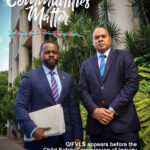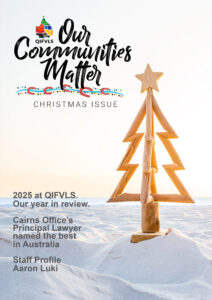



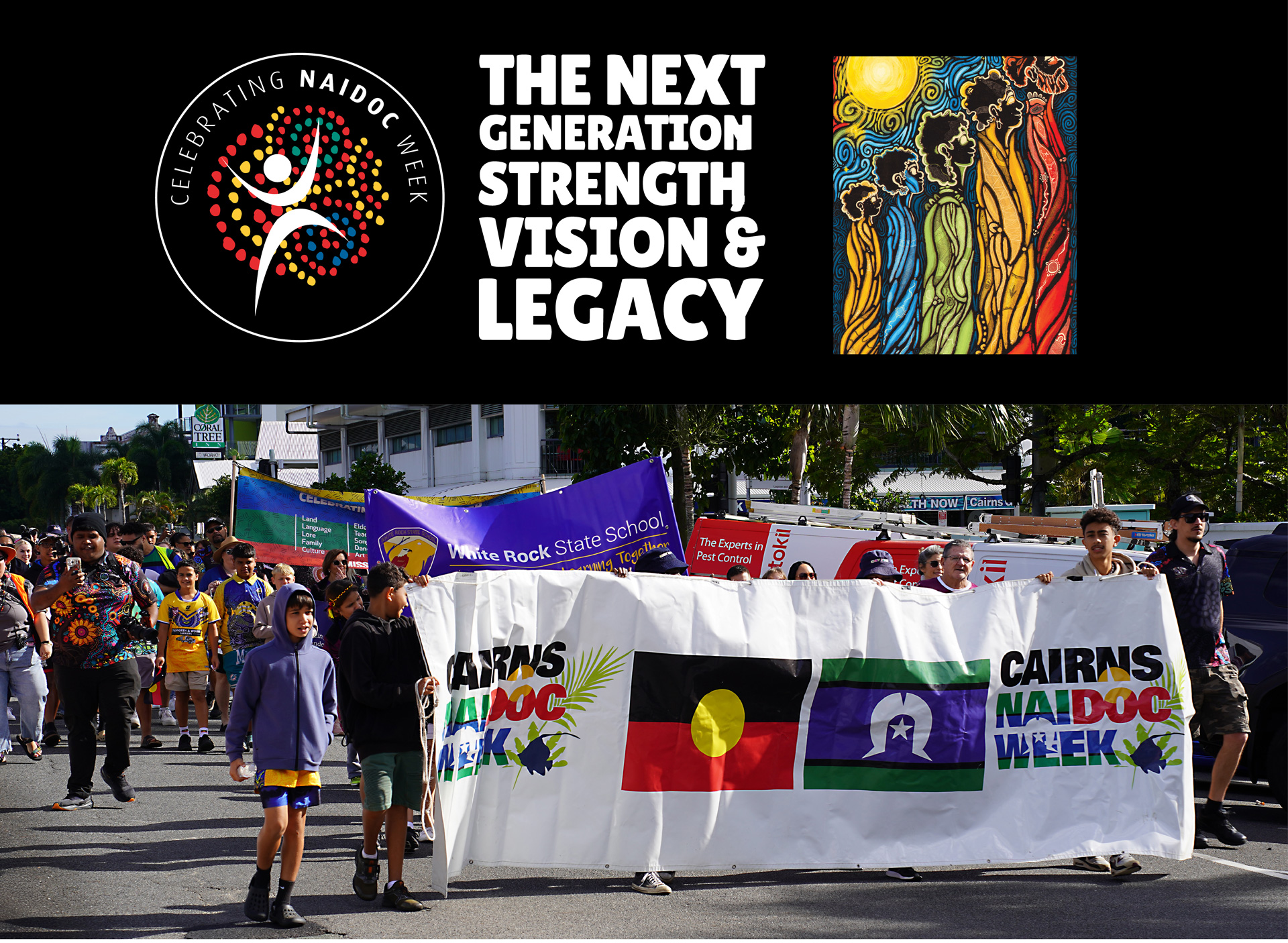
This year marked 50 years of NAIDOC Week with QIFVLS’ offices participating in community events across the state to celebrate the history, culture and achievements of Aboriginal and Torres Strait Islander peoples. To mark this half century milestone, the theme for 2025 was, ‘The Next Generation: Strength, Vision & Legacy’, which celebrates achievements of the past while also looking ahead to the opportunities of a self-determined future.
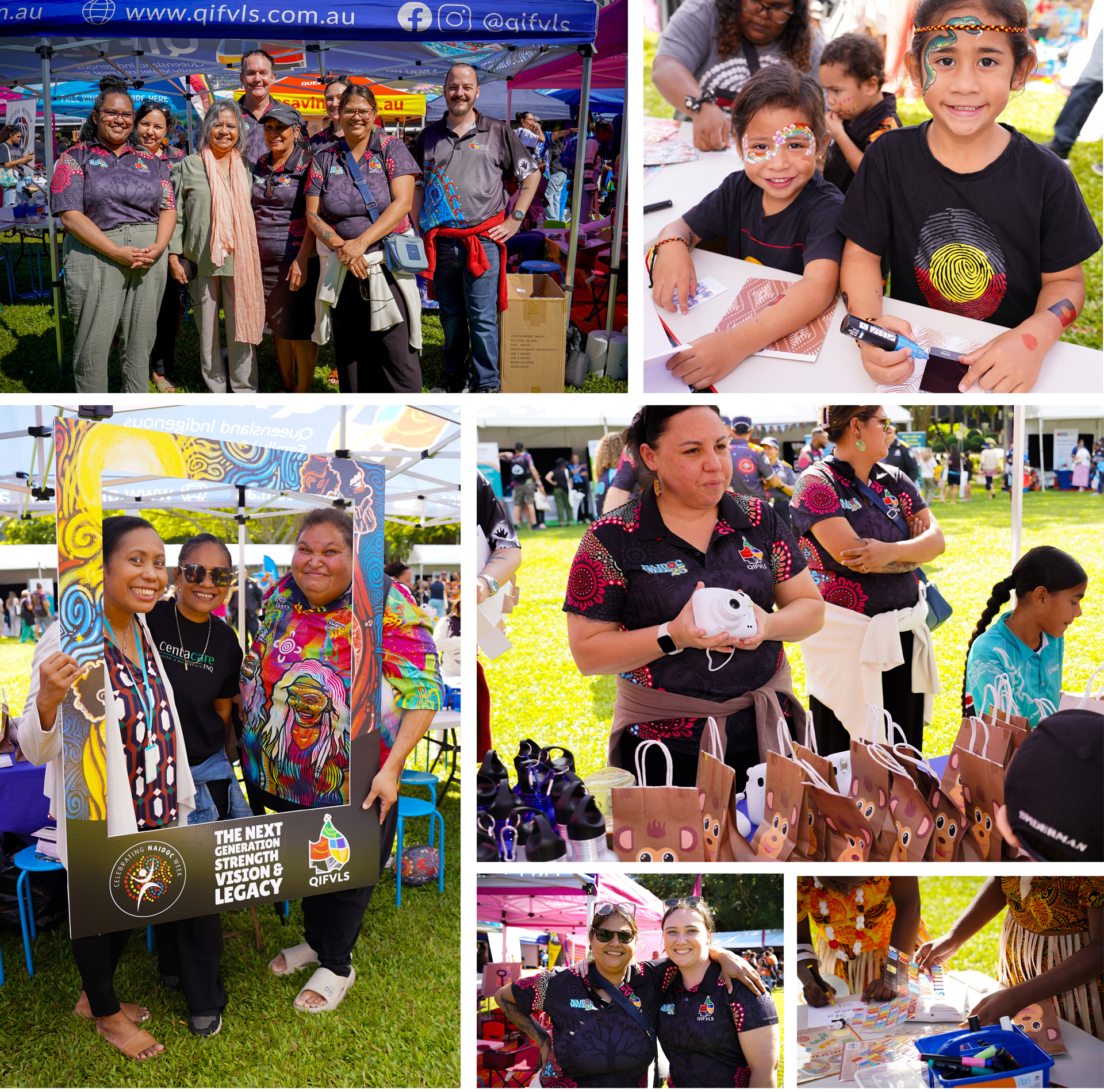
The Cairns Service Delivery Team embraced this year’s NAIDOC in the Park event at Fogarty Park on July 7 with their trademark enthusiasm and commitment. The team arrived early, setting up their marquee, the give-away packs and kid’s craft activities that they’d preparing over the previous weeks.
Earlier that morning, Cairns Head Office staff had joined with thousands of others on the annual NAIDOC march as it wound its way from Munro Martin Parklands to Fogarty Park. The march always impresses with its huge and colourful turnout, with office workers and tourists alike coming out to watch the passing stream of chanting marchers that stretch for hundreds of metres.
NAIDOC Week in Cairns grew into almost a month, with celebrations and events carrying on well into July. The Cairns Service Delivery Team attended NAIDOC events at Ravizza Park in Edmonton, south of Cairns, and at White Rock State School. Both events drew large crowds from the community and provided QIFVLS with plenty of opportunity to engage with local residents.
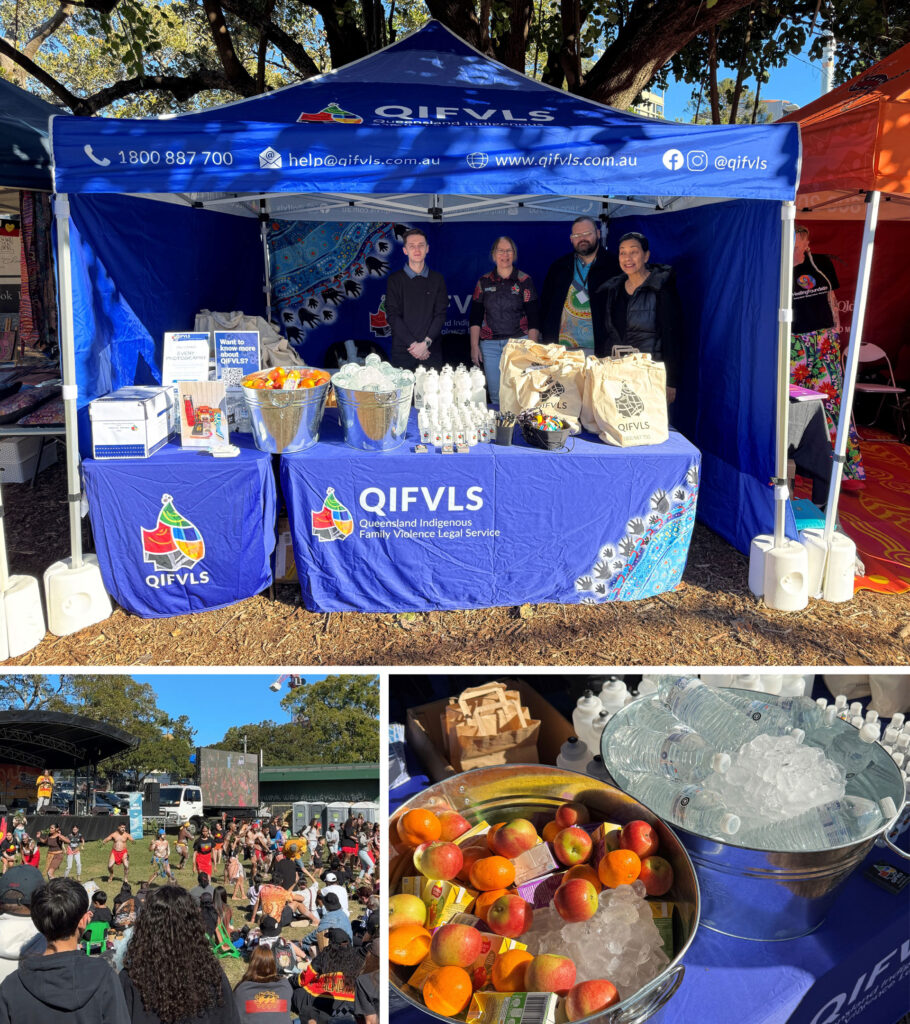
The Brisbane NAIDOC event was held at Musgrave Park, in West End on 11th July. It was a great day, and included two stages featuring performers and cultural speakers, with numerous stalls from a wide range of government and not-for-profit agencies. The QIFVLS stall was staffed by the Brisbane office team, including Principle Lawyer Brandon Begley, Senior Data Administration Officer Mandy Tedeschi and Lawyer Mark Platt, with Case Management Team Leader Tayla Dyer flying down from Rockhampton to help. The team gave out show bags and offered free fruit and bottled water which created ‘ice breakers’ for the team to yarn about QIFVLS’ services to event attendees.
They also ran a trivia competition with the winners taking home prizes. The Brisbane team loved the opportunity to spread the QIFVLS message, not just with the Aboriginal and Torres Strait Islander people in attendance but also other stakeholders and referral partners, resulting in worthwhile conversations and relationship-building.
A big thankyou to Administration Officer Pam Donovan for organising so many of the behind-the-scenes show bag coordination.
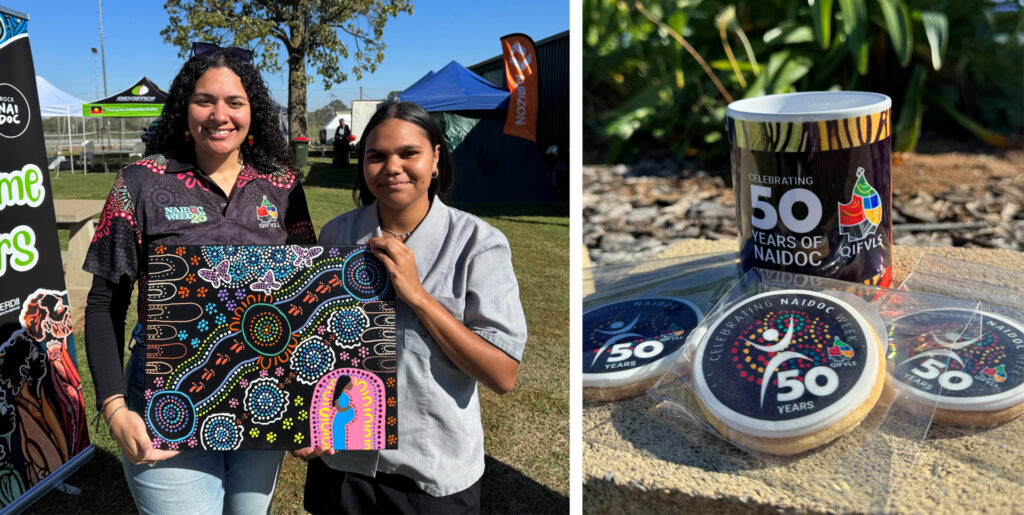
As well as assisting with the Brisbane event, Rockhampton’s Case Management Team Leader Tayla Dyer also attended NAIDOC celebrations in Blackwater. A highlight of the day was the presentation of a painting to her by a local student.
Tayla said, “While attending a recent Blackwater NAIDOC event, this painting was gifted to me by a talented high school student, Mary. This painting holds deep meaning connected to my journey in motherhood. I have known Mary for a few years now, first meeting when she began high school and we attended Blackwater SHS to complete our CE’s and CLE’s. Mary was always engaging and participating in these sessions, and I would receive feedback from the school advising that Mary was looking forward to our next visit”
The event also featured cups and cookies printed with the event theme and celebrating NAIDOC’s 50 Year anniversary.
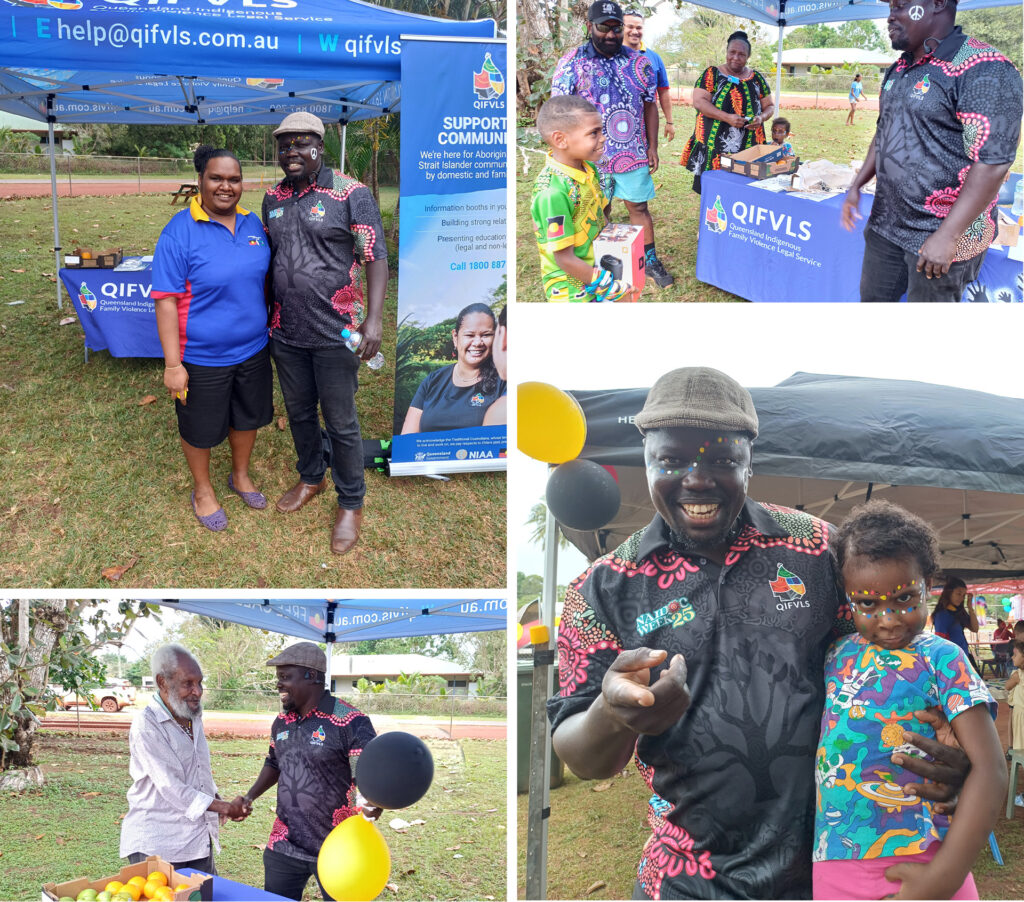
QIFVLS’ Bamaga office joined in the NAIDOC celebrations with Graduate Lawyer Ocholamero Oroto hosting a stall alongside the local Youth Hub. A highlight was for someone to deliver an impromptu talk on the meaning of NAIDOC and to provide some commentary on the event. Young Michael was up for the challenge and won himself a JBL mini speaker.


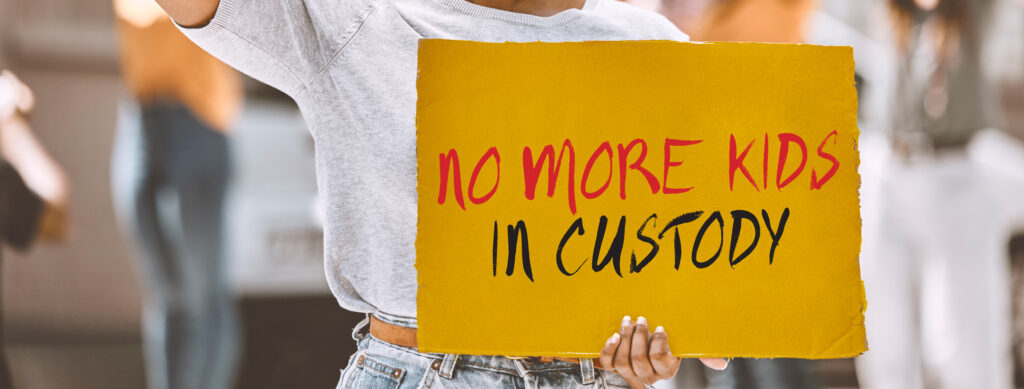
A new report submitted to the United Nations Human Rights Council has found persistent failures by Australian governments to implement recommendations from royal commissions and coronial inquests are contributing to ongoing systemic injustices experienced by First Nations people.
The report, backed by a coalition of more than 150 Aboriginal and Torres Strait Islander, human rights, legal, disability, refugee, LGBTIQA+ and climate organisations, has been presented ahead of Australia’s Universal Periodic Review (UPR) — a regular assessment of member states’ human rights performance.
It calls for the urgent creation of a national action plan and an independent Indigenous-led monitoring body to implement the United Nations Declaration on the Rights of Indigenous Peoples (UNDRIP), in genuine partnership with First Nations communities. The report also recommends establishing a Makarrata Commission within 18 months to oversee national truth-telling and treaty negotiations.
Additionally, the coalition is urging the federal government to introduce reparations for Stolen Generations survivors, enact a Human Rights Act within two years, and ensure all existing laws are compatible with human rights obligations.
Change the Record Chief Executive, Jade Lane, said Australia’s human rights framework is failing to protect thousands of people.
“The Albanese Government must take urgent action – including legislating an Australian Human Rights Act — to ensure everyone is treated with dignity, equality and respect,” she said.
Earlier this year, the Queensland government — in introducing their controversial ‘adult crime, adult time’ laws — admitted the legislation did not stand up to human rights scrutiny and would disproportionately impact First Nations children.
Indigenous Peoples’ Organisation Australia Co-Chair Cathryn Eatock said systemic inequality is being entrenched across the country.
“Our children are dying of preventable rheumatic heart disease caused by poverty and overcrowding, with often 20 people per house in remote communities, reflecting abysmal 3rd world conditions,” Ms Eatock said.
“Children as young as 10 are incarcerated, funnelling them into later crime, where deaths in custody is a regular occurrence.”
Despite the dire findings, Ms Eatock believes change is possible — if governments commit to genuine self-determination.
“Victoria’s treaty processes have shown the way; to implement UNDRIP, instil self-determination and respectful relations,” she said.
The report places strong emphasis on First Nations land rights and justice, areas it says are being further eroded.
It calls for federal funding within 12 months to help establish a permanent national Indigenous representative body and human rights institutions. The report also criticises the Native Title system as reinforcing “systemic inequality” and lays out a comprehensive list of reforms including improving compensation, land acquisition support, and enforcing Free, Prior and Informed Consent.
On justice, it documents the mass incarceration of Indigenous Australians and the nearly 600 Aboriginal deaths in custody since the 1991 Royal Commission — the recommendations from which remain largely unfulfilled.
It demands urgent reforms: raising the minimum age of criminal responsibility to 14, implementing community-based diversion programs, auditing policing laws to eliminate discriminatory practices, and reforming strip search laws across all jurisdictions.
Human Rights Law Centre Chief Executive, Caitlin Reiger, echoed calls for urgent federal action.
“Thousands of people are having their fundamental human rights breached every day — from not being able to access healthcare, to being restricted from expressing their views, and not able to keep a safe roof over their heads,” she said.
“The Albanese Government must take urgent action — including legislating an Australian Human Rights Act — to ensure everyone is treated with dignity, equality and respect.”
This article was originally published in National Indigenous Times, July 21 2025.

Over the coming months Our Communities Matter will feature conversations with members of our team yarning about their areas of specialty and expertise. This month, QIFVLS’ Director of Legal Practice Aaron Luki and Principal Lawyer Isabella Copetti discuss child protection matters and cultural competency within a legal framework.
Apologies for the sound quality on Isabella’s microphone during parts of this discussion.

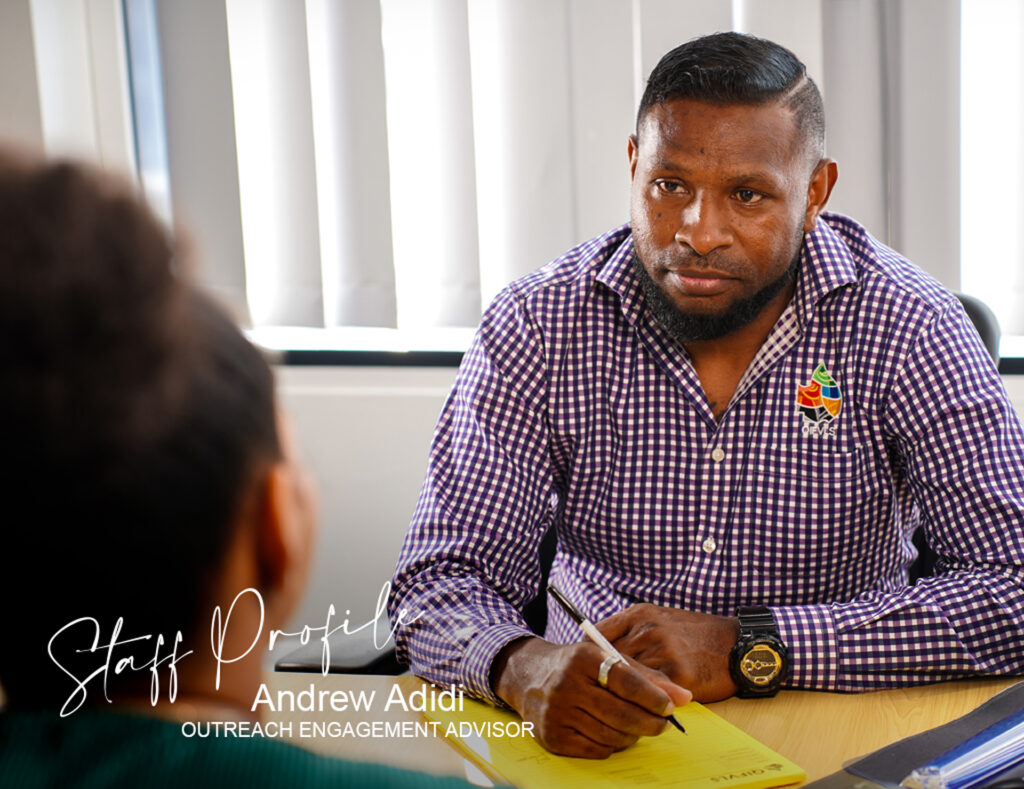
Behind his joke-around exterior and outgoing personality is a member of our Case Management Team who is also deeply committed to the well-being of his community and a leader of his Church.
This month’s staff profile features Andrew Adidi, an NPA and Torres Strait Islander man who has been integral to the QIFVLS team in Cairns for the past five years.
OCM: Perhaps you could give us a bit of an outline of where you were born and raised.
Andrew: I was born in Cairns and originally raised in Bamaga in the NPA, and on Thursday Island.
My dad was the Chairman Counsellor in Bamaga, and he wanted me to get my education in Cairns where there were more opportunities, so mum and I moved down when I was seven. Dad passed a year later so it was just my mother and me from then on.
OCM: What language were you speaking when you arrived in Cairns?
Andrew: The eastern island language, because mum’s from Murray Island, plus Creole, but I could also speak English which was my first language. Dad was from Saibai Island, but I never learnt to speak that.
OCM: I know you’ve been playing footy for a long time, did you start back in primary school?
Andrew: I was a fast runner when we played tiggy, as we called it – what most people call tag. My uncle noticed my speed and signed me up to Little Athletics. I was winning the age championships every year from primary to high school. When I went to Woree High School my maths teacher, who was also the rugby coach, suggested I try playing league.
I started playing on the wing and found I loved the game. Well, it was rugby league to start with and then joined into rugby union as well. Going through to my senior school years, I was making the representative sides in Peninsula and Queensland with rugby union and in Year 12 was selected for the Queensland Reds Under 21s.
The next year I moved to Brisbane on a scholarship with the Reds and played first grade with the West Bulldogs, which is one of the A-Grade clubs in Brisbane. I played alongside my childhood idol Damian Marsh who had been an Australian sprinter at the Olympics. He was playing on one wing, and I was on the other. We were a quick side. I couldn’t keep up with him though.
I was in Brisbane for two years before I had a turnaround with my health and I moved back to stay with mum in Cairns for a while.
I did get selected for Australian Sevens for their South African Tour, but it turned out that I had developed diabetes. The diagnosis changed my whole life. Back then, in the 90s, there was no support like there is today. I had no family in Brisbane and just coming back home to be with family on was what I felt I needed at the time. It was a whole new life change – eating better, working with dietitians and so on.
OCM: After your reset, where did you go?
Andrew: I was still playing club rugby here in Cairns, but I also did a Certificate Three at TAFE in hospitality and waiting. My first job was as a bartender at the old Playpen nightclub. Yeah, I saw a lot ‘interesting’ things go on in there!
From there I started cheffing at Donnini’s Ciao Italia restaurant. I started by just doing their pizza because I knew how to do knead the dough from mum teaching me to make damper. They noticed how quickly I worked and moved me up to sous chef, doing sides and pasta. In the end I became a pizza chef and would have been with them for about six years.
It was while I was at Donnini’s that I got into ministry. A lot of us Islanders grew up in church. When the London Missionary Society came to the Torres Strait, they introduced the Bible to the islands and the Elder’s faith comes from that. So, I went back to church and gave up all the bad stuff that pretty much ruined my health after spending two years in Brisbane trying to fit into a culture that was new to me.
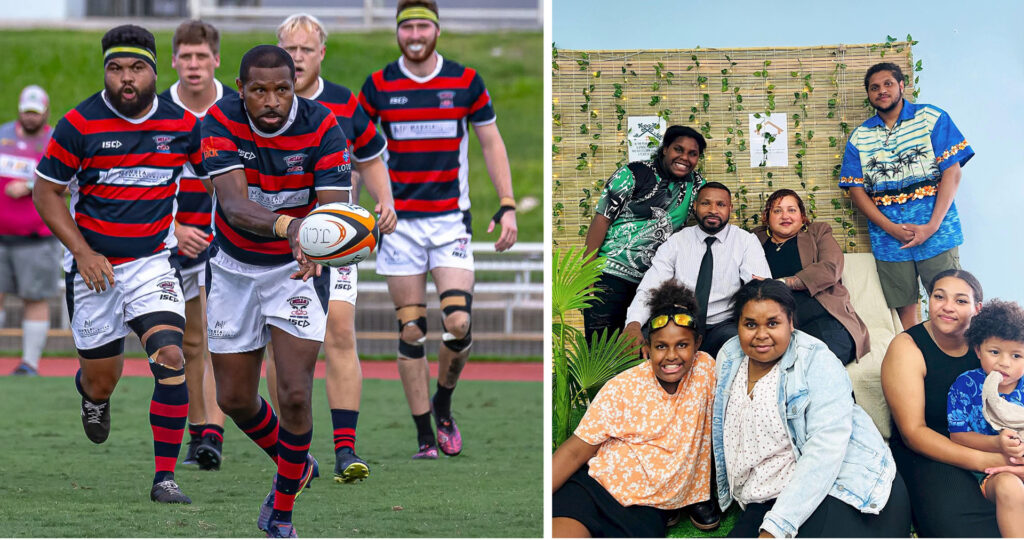
I had been called “The boy from the sticks “and was left out a lot. I had to join in on the drinking every day, drinking weekends, joining in the drinking games. At the time I felt it was the only way I could fit in – just to be one the boys. And then I woke up in hospital one night after passing out in a night club. The doctor just said, “Your pancreas has failed and could not hold the amount of sugar, you have to be on insulin for the rest of your life”.
So, from then on, I changed my whole lifestyle and started looking to our future as well.
OCM: Our future?
Andrew: That’s with Meker, who’s now my wife.
OCM: How did you both meet?
Andrew: It was at a network event in 2002. I saw her and noticed she kept glancing at me like we were sort of like playing tag. Then one of her brother’s came up to me and said, “Oh, what are plans for tonight? You want to do something? Here this is my number, call me”. I had a rugby game that night, and I rang after the game and Meker answered. They’d set me up! Anyway, we ended up talking, had a few dates and the rest is history.
We got married in 2009 after we’d already had a son and a daughter. We weren’t in ministry or church for the first few years and it was when I was at Donnini’s that I decided it was time to make some changes. We started to think about our future, our health, our kids, future grandchildren. So, we thought we’d go back into the faith and after a few years I became an associate pastor in one of the ministries here.
In about 2012 the pastor asked me to look after the church as he was moving back to the islands and then a few years after that we branched out and set up our own ministry in full gospel, Pentecostal faith.
OCM: How would you characterise your ministry?
Andrew: We are family-based ministry that focuses on strengthening and supporting families as the foundation of both the community and ministry. The ministry recognises the family as a core unit of spiritual growth and community life.
We have a normal Sunday morning service. We don’t have night services only because we leave it open, because we’re usually invited by other ministries to speak there, or they invite us along to have a combined service.
We have our programs. Monday, we have our leadership group, Tuesday is prayer meeting, Wednesday is the women’s program, Thursday is LoveKnot for the couples, Friday is for youth, and Saturday nights are men’s group. It’s a lot, there’s always a bunch of activities going on. Our programs are intentionally inclusive of all generations – children, youth, men and women, parents, grandparents, and caregivers. We offer marriage enrichment, parenting workshops, and counselling services. We support families through life transitions such as births, grief, divorce or blended families.
After I became senior pastor of the church, I became the FNQ national leader, together with my wife, but also coordinators for Torres Strait Island and the NPA. We’d organise conferences and do a lot of events within ministry across Far North Queensland and the Torres Strait.
I eventually left Donnini’s to soley focus on my ministry work, which I did for a few years until a conversation with QIFVLS’ Aaron Luki in late 2019. I knew of Aaron through his brother Dwayne Luki, who I’d gone to school with and played footy with in the Queensland Reds Under 21s. We also had a connection through community. Aaron and I were having a yarn at our son’s basketball game when he mentioned that there was a legal support officer position opening at QIFVLS and could that be of interest to me.
It connected so closely with my existing community work that I applied and started working there in 2020.
OCM: After five years at QIFVLS how do you think you’ve grown over time?
Andrew: I already knew how to do the community work and engagement with mob, but I learnt a lot about the legal matters with the first lawyer I was assigned to, whose name was Denise. Denise had a good sense of humour and insisted that even I had to attend court in a suit and tie. Eventually court security would just wave me through assuming I was lawyer. That was awesome.
OCM: What do you enjoy about your work here?
Andrew: I truly love the work that I do within QIFVLS, supporting Indigenous families through some of the most difficult and painful moments of their lives. Being part of a team that walks alongside individuals affected by domestic violence, child protection issues, and victims assist is more than just a job – it’s a calling.
It’s incredibly rewarding to witness the strength and resilience of our clients as they engage with programs, gain new tools, and take meaningful steps towards healing and change. Seeing them grow, reclaim their voice, and build safer, healthier future for themselves and their families makes every challenge worth it. This work is not always easy but filled with purpose. I feel honoured to be trusted in this space and to contribute to breaking cycles, empowering communities, and restoring hope where it’s needed most.
OCM: Other than your ministry work. I mean, what else do you do on your days off?
Andrew: Obviously rugby, rugby training. I have my grandson, my first grandson. He has autism but he’s our little miracle baby. He was diagnosed that he wouldn’t be able to walk or even talk but my daughter and her partner, as well as me and my wife, and all our family just have this strength for him and each other. He has developed and now he walks and talks, and we thank God for the miracle.
A couple of years ago I did a charity boxing match to support Cairns Autism – a local support service. My grandson was on the poster for the event with me.
OCM: That’s so impressive. How did you go?
Andrew: They have it here in Cairns for non-professional fighters. Some are trained amateur fighters from the community but there’s also footy players and others that are prepared to give it a go.
My opponent was a solicitor from Sydney who was training here in Cairns for about two months. When I saw this guy, and I was like: ‘This looks like the scene from Rocky Three. He was Ivan Drago, and I was Apollo Creed’ – a huge guy with massive reach. I thought, is this rigged? When we were practicing before the fight, he was hitting the bags and the sound echoed through the arena – boom, boom, boom. I set a strategy of dodging the punches but it all just ended in twenty seconds when I knocked him out cold! He came straight out at me hard and I responded with the ol’ Mike Tyson fake low, and as both his hands came down, I went over the top and I got him a good one.
It took about two to three minutes for him to wake up. I was really worried because the last thing I saw were his eyes rolling backwards as he went down. Later that night, I went to see how he was doing but couldn’t find him. I contacted the promoter the next day and he told me that my opponent had left the arena that night in an ambulance to the hospital. I contacted him a few weeks later through Facebook and he said he was all good. We had both things in common – we both worked in the legal space and he was also a Christian. He ended up saying, “Oh, that’s okay, brother, I forgive you. We were getting out there and doing all that stuff for charity”.
OCM: Well, with that knockout of a story Andrew, all I can say is ‘Thanks for sharing’.
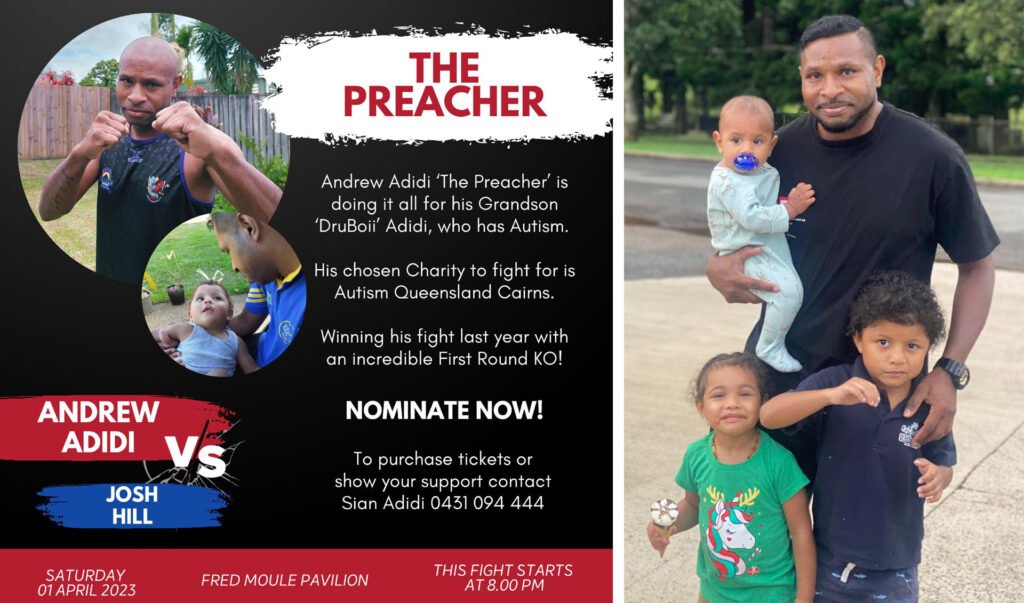



When an individual or organisation makes a tax deductible donation to QIFVLS, they can be confident that their funds are going towards making a tangible difference to the safety and welfare of Aboriginal and Torres Strait Islander people experiencing or at risk of domestic and family violence.
Our team are grateful for all donations that help our not-for-profit organisation to continue offering this critical service. Donations of $1,000 or more help fund outreach services to some of Queensland’s most remote ATSI communities.


Are you in search of a rewarding profession that will take you on journeys through the breathtaking landscapes of Queensland? One that promises not only career advancement and skill enhancement, but also attractive perks, substantial travel allowances, and one-of-a-kind professional adventures? Are you drawn to a career that enables you to make a positive difference in the lives of others?
Look no further – your new career awaits you! At QIFVLS, we are dedicated to combating Family and Domestic Violence within Aboriginal and Torres Strait Islander Communities. Our methods encompass education, advocacy, legal reform, court support, and casework assistance. By focusing on early intervention and prevention, our aim is to empower individuals impacted by Family Violence to regain control over their lives. We are in search of outstanding and dynamic individuals who can join us in achieving this mission.
If you envision yourself fitting into this scenario, we encourage you to see what’s available here.


